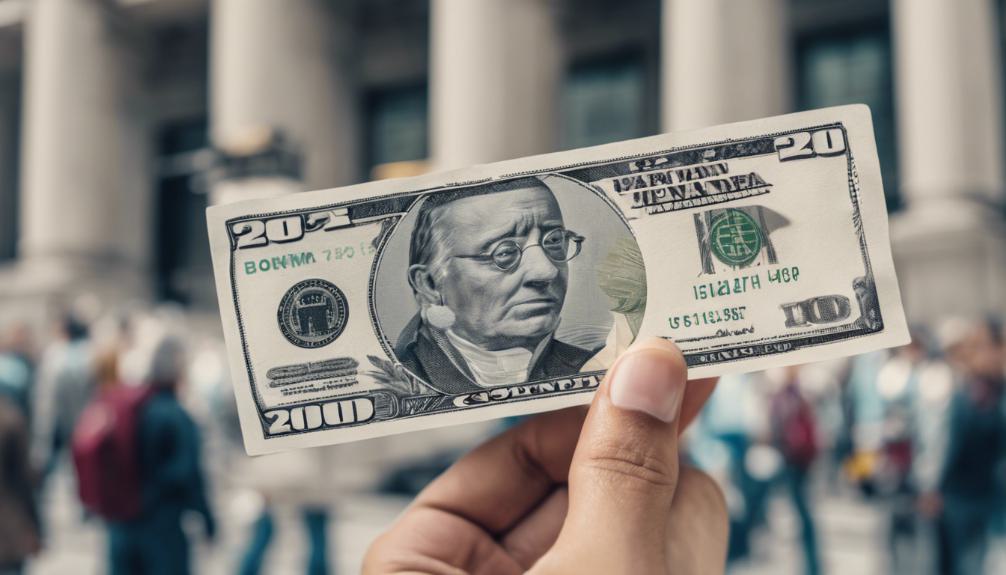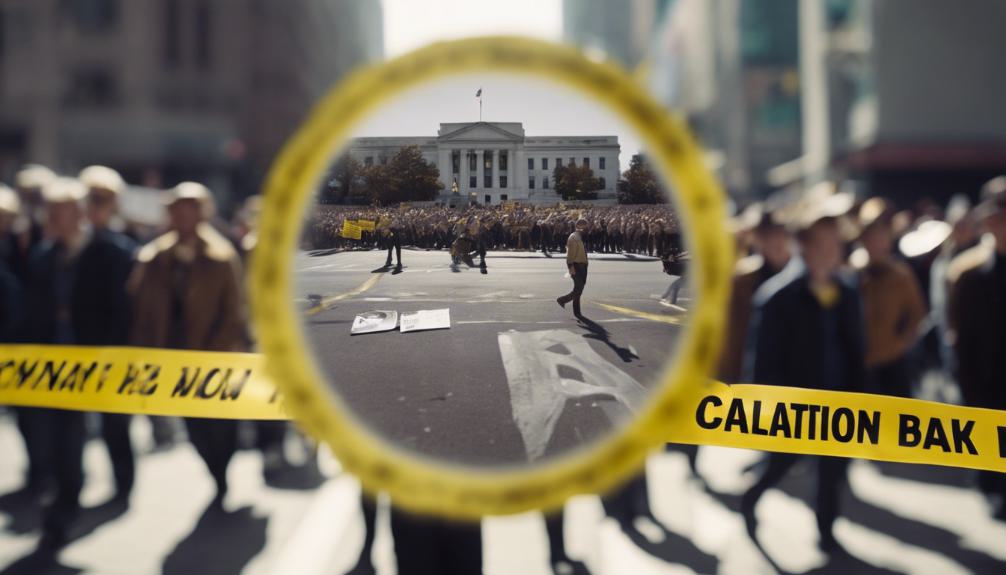Banks Caught in Foreign Fee Overcharge Scandal
The recent uncovering of alleged foreign transaction fee overcharges by leading banking institutions, including Bank of America, Capital One, and TD Bank, has ignited a significant inquiry into the transparency and legality of their practices. This investigation, prompted by accusations of misrepresenting exchange rates to the detriment of consumers, raises pertinent questions about the integrity of financial operations on a global scale. As the legal proceedings aim to address and rectify the financial discrepancies faced by millions, the outcome of this case could set a precedent for the regulation of international banking fees. The broader implications for consumer rights and bank accountability remain a focal point of interest, warranting a closer inspection of the evolving situation.

Key Takeaways
- Bank of America, Capital One, and TD Bank are implicated in charging unlawful fees on foreign transactions.
- Allegations include misrepresentation of exchange rates, leading to systematic overcharging.
- Investigations aim to uncover the extent of overcharging by comparing transaction rates to standard market rates.
- Legal actions may enable affected cardholders to seek compensation and push for more transparent banking fee structures.
Affected Banks and Cards

Investigated for allegedly imposing unlawful fees on foreign transactions, Bank of America, Capital One, and TD Bank are at the center of a scandal affecting users of their issued cards. These prominent financial institutions are now under scrutiny for their practices related to handling foreign currency purchases. Cardholders who utilized their services for transactions abroad or online purchases in foreign currencies may have been subjected to undisclosed or misrepresented exchange rates. This situation has prompted a thorough investigation by legal teams aiming to uncover the extent of potentially illegal fee imposition. The allegations suggest that the lack of transparency and possible misinformation could have led to customers being overcharged, a scenario that undermines trust and raises serious concerns about compliance with financial regulations.
Investigating Unlawful Fees

As attorneys explore further into the issue, they are uncovering instances where foreign transaction fees may have been illegally imposed by Bank of America, Capital One, and TD Bank. The investigation zeroes in on allegations that these institutions misrepresented exchange rates, overcharging customers for transactions made in foreign currencies. Legal teams are meticulously examining transaction records and bank statements to identify irregularities and patterns of overcharging. This scrutiny is not only focused on the direct fees charged but also on how currency conversion rates were applied, comparing them against standard market rates to pinpoint discrepancies. The objective is to establish a thorough understanding of the mechanisms through which customers might have been unfairly charged, laying the groundwork for potential restitution and corrective actions by the implicated financial institutions.
Unlawful Fee Overview

Understanding the nature and implications of unlawful fees charged on foreign transactions is crucial for affected bank customers. These illicit charges often stem from banks misrepresenting exchange rates during transactions that, while conducted in U.S. dollars, are credited in foreign currencies. The allegations against institutions like Bank of America, Capital One, and TD Bank suggest a systematic overcharging on foreign transactions, exploiting the complex nature of currency exchange to their advantage. This practice not only violates trust but also regulatory standards, leading to investigations and potential class action lawsuits aimed at rectifying the situation. For customers, the challenge lies in detecting these hidden fees, which often require a meticulous review of transaction details to uncover.
Foreign Currency Purchases

Building on the overview of unlawful fees, it's imperative to examine the nature of foreign currency purchases and how they become a vector for these charges. These transactions encompass goods bought abroad or online purchases made in a currency other than the U.S. dollar. The process inherently involves the conversion of currencies, a stage ripe for the imposition of hidden or inflated fees. Banks, including Bank of America, Capital One, and TD Bank, are under investigation for allegedly exploiting this conversion process. By misrepresenting exchange rates, these financial institutions may have systematically overcharged customers, turning every foreign transaction into an opportunity for undue profit. The implications of these practices are vast, affecting potentially millions who engage in such purchases, unwittingly incurring extra costs.
Common Overcharging Scenarios

Customers frequently encounter overcharging during transactions involving currency conversion, with banks accused of manipulating exchange rates to their advantage. This scenario typically unfolds when individuals use their bank-issued cards for purchases in a foreign currency, whether while traveling abroad or making online purchases from international vendors. The core issue lies in the discrepancy between the exchange rate applied by the bank and the actual market rate at the time of the transaction. Banks are alleged to inflate exchange rates or impose additional, hidden fees, resulting in customers paying more than they should. This practice not only affects direct purchases but also extends to ATM withdrawals in foreign countries, further complicating the financial impact on consumers engaging in cross-border transactions.
Allegations Against Banks

Having outlined common overcharging scenarios, it is imperative to examine the specific allegations made against banks regarding the imposition of unlawful fees on foreign transactions. The primary accusations against institutions such as Bank of America, Capital One, and TD Bank revolve around the alleged misrepresentation of exchange rates during foreign currency purchases. This deceit purportedly led to customers being overcharged. The transactions in question include both goods bought abroad and online purchases made in foreign currencies. Attorneys are currently investigating these practices, focusing on whether these banks illegally benefited by charging higher than warranted fees under the guise of currency conversion. The detection of these hidden fees has been challenging, prompting a call for affected consumers to come forward and participate in the investigation, highlighting the seriousness of these allegations.
Impact of Settlements

In the wake of these allegations, settlements could alter the financial landscape for both affected consumers and the banks involved. Additionally, these resolutions may compel banks to reimburse millions of dollars to customers who were overcharged for foreign transactions. This financial restitution could serve as a significant step towards rectifying the breach of trust and ensuring greater transparency in bank fee structures moving forward. Furthermore, the settlements could prompt stricter regulatory oversight and policy reforms aimed at preventing similar incidents. For the banks, aside from the financial outlay, the reputational impact could incentivize the establishment of more customer-centric practices. Ultimately, the settlements represent a pivotal moment for both consumer rights and banking standards, potentially setting a precedent for the handling of similar issues industry-wide.
Detecting Hidden Fees

While settlements highlight the financial and reputational impacts on banks, identifying hidden fees presents a significant challenge for consumers seeking to understand the true cost of foreign transactions. The intricacies of international banking fees often leave customers in the dark about the actual expenses associated with their overseas or foreign currency purchases. Given the allegations against major banks for misrepresenting exchange rates and overcharging, the detection of these hidden fees becomes paramount. Consumers are urged to meticulously review their transaction statements and seek clarity on the breakdown of charges. However, without expertise in financial regulations and currency exchange mechanisms, pinpointing these discrepancies can be intimidating. This situation underscores the necessity for more transparent banking practices to empower consumers in managing their finances effectively.
Class Action Lawsuit Explained

A class action lawsuit has been initiated against Bank of America, TD Bank, and Capital One, aiming to address the alleged unlawful overcharging on foreign transactions. This legal action brings to light the practices of these financial institutions, which are accused of misrepresenting foreign exchange rates, thereby leading to customers being overcharged. The lawsuit seeks to represent all individuals who have used cards issued by these banks for foreign currency purchases, including both physical goods bought abroad and online transactions in a foreign currency. The core issue revolves around the banks allegedly charging accounts in USD while sellers were credited in another currency, resulting in discrepancies in the exchange rates applied and higher fees for the consumers.
Benefits of Legal Action

Understanding the implications of the class action lawsuit against major banks reveals significant potential advantages for consumers impacted by foreign transaction fee overcharges. Legal action serves as a critical mechanism for holding financial institutions accountable, ensuring they adhere to fair practices and regulations. By collectively challenging the banks' alleged misrepresentation of exchange rates and hidden fees, affected cardholders can seek monetary compensation for the overcharges they endured. Additionally, this litigation may prompt systemic changes within the banking industry, leading to more transparent and equitable fee structures for all customers. The lawsuit also highlights the importance of vigilance and consumer awareness in financial dealings, potentially deterring similar unethical practices in the future.
Consumer Action Steps

To effectively address the issue of foreign transaction fee overcharges, affected consumers are encouraged to initiate the process by completing a specific form related to their card usage during the implicated period. This form, typically available on the investigating attorneys' or consumer rights organizations' websites, requires detailed information about the transactions in question, including dates, amounts, and the currency involved. Submission is the first critical step in joining the class action lawsuit, ensuring that consumers' cases are considered in the pursuit of compensation and rectification of the alleged illegal practices.
It's imperative that consumers gather all relevant transaction records and statements to substantiate their claims. This organized approach not only streamlines the process but also strengthens the collective case against the banks involved, highlighting the importance of meticulous record-keeping in financial matters.
Participation Costs

After exploring the steps consumers should take to address the issue of foreign transaction fee overcharges, it is important to examine the costs associated with participating in the class action lawsuit. Participation in the lawsuit is designed to be accessible, with no upfront charges to discuss rights or join the investigation. This approach guarantees that all affected parties, regardless of their financial situation, have the opportunity to seek justice and potentially recover funds that were unlawly charged. The legal framework surrounding class action lawsuits typically allows attorneys to recover fees only from a portion of any settlement or judgment awarded, meaning participants aren't burdened with out-of-pocket costs. This structure is pivotal in encouraging widespread participation and ensuring that the pursuit of justice is not hindered by financial barriers.
Nationwide Impact

The overcharging scandal involving foreign transaction fees by major banks has the potential to affect millions of consumers across the United States. As investigations deepen into the practices of Bank of America, Capital One, and TD Bank, the scope of affected parties broadens, highlighting a systemic issue within the financial industry. This issue not only questions the transparency and fairness of bank fees but also impacts consumer trust in financial institutions. The alleged misrepresentation of exchange rates and hidden fees could lead to significant financial losses for unsuspecting consumers, amplifying the call for stringent regulatory oversight. Additionally, the nationwide impact underscores the urgency for thorough reform to protect consumers from unfair practices, ensuring that their financial interests are safeguarded in an increasingly globalized economy.
Steps for Affected Users

Individuals impacted by the foreign fee overcharge scandal should promptly review their bank statements for any discrepancies in transaction fees. It's important to carefully examine transactions involving foreign currency purchases, including online purchases made in foreign currencies, to identify any potential overcharges. Affected users should gather evidence of questionable fees by documenting transaction details, dates, and the amounts charged versus the amounts expected. This documentation will serve as an essential resource for resolving disputes with the banks.
Additionally, consumers are encouraged to contact their bank's customer service department to report suspected overcharges. It's crucial to provide detailed information and evidence during these conversations. Taking these steps can help guarantee that any unwarranted fees are corrected and potentially refunded.
Legal Rights and Advice

Understanding your legal rights is pivotal in maneuvering through the complexities of the foreign fee overcharge scandal. Consumers who used cards issued by Bank of America, TD Bank, or Capital One for foreign transactions may be entitled to compensation for overcharged fees. Legal investigations suggest these institutions may have misrepresented exchange rates, leading to undue charges. Affected parties are advised to join the class action lawsuit to potentially recover lost funds. Participation in the investigation is at no cost, with the aim to halt these allegedly unlawful practices. It's essential to review transaction statements for hidden fees and consult with legal representatives to understand your entitlements. Taking these steps guarantees your rights are protected and voices heard in this significant financial dispute.
Frequently Asked Questions
How Do These Unlawful Fees Affect My Credit Score?**
Unlawful fees from foreign transactions primarily impact financial accounts rather than directly affecting credit scores. However, if these charges lead to overdrafts or unpaid balances, they could indirectly influence your credit score negatively.
While the Primary Focus of the Investigation and Subsequent Articles May Be on the Financial Impact and Legal Aspects of the Overcharging, the Effect of These Practices on Consumers' Credit Scores Is a Nuanced Detail That Might Not Be Covered. Questions About Whether Disputed Charges or Refunds for Overcharges Could Influence Credit History or Scores Would Be Pertinent.
The inquiry into the effects of disputed charges or refunds from overcharging on consumers' credit scores is important, given the potential implications for credit history. Such financial activities could indeed influence one's credit standing.
Can Businesses Also Participate in the Class Action Lawsuit if They Were Affected?**
Businesses affected by unlawful foreign transaction fees may potentially participate in the class action lawsuit. It is advisable for entities to consult legal professionals to discuss eligibility and the process for joining the lawsuit.
Most Discussions Around Class Action Lawsuits and Bank Overcharges Tend to Focus on Individual Consumers. However, Businesses That Use Cards Issued by Bank of America, Capital One, or TD Bank for Foreign Transactions Might Also Be Affected by These Fees. the Eligibility and Process for Businesses to Join the Lawsuit Could Be a Gray Area Not Immediately Addressed in General Articles.
Businesses utilizing Bank of America, Capital One, or TD Bank-issued cards for foreign transactions may also be impacted by overcharges, raising questions about their eligibility and the process for joining potential class action lawsuits.
What Steps Can I Take to Prevent Being Overcharged in the Future?**
To prevent future overcharges, regularly review account statements for unexpected fees, use currency conversion tools for comparison, and consider cards with transparent foreign transaction policies. Stay informed about class action lawsuits and legal settlements related to banking practices.
Conclusion
To sum up, the ongoing investigation into major banking institutions for allegedly imposing illegal fees on foreign transactions represents a significant concern for consumer rights and financial transparency. The allegations of misrepresented exchange rates and inflated charges underscore the need for stringent oversight and accountability within the banking sector. This case highlights the importance of legal recourse in addressing corporate malfeasance, offering a pathway to restitution for affected individuals. It serves as a critical reminder of the vigilance required to safeguard consumer interests in an increasingly globalized economy.

This post has been generated by AI and was not reviewed by editors. This is Not legal advice. Please consult with an attorney.




